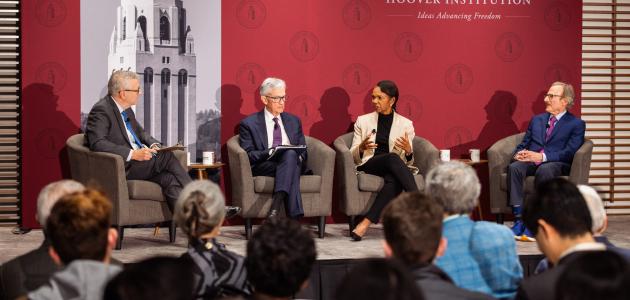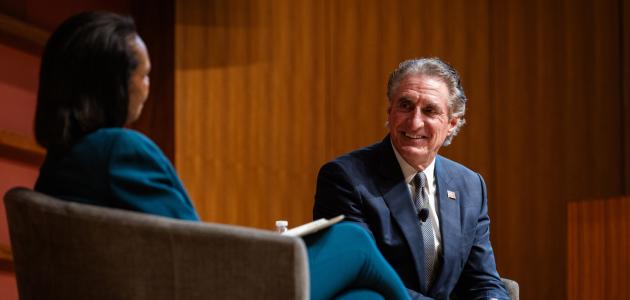A weekly digest of the latest news and research related to the work of the Technology, Economics, and Governance Working Group. Topics covered in the digest include cybersecurity, domestic regulation, innovation, international competition, social media disinformation, and the California exodus.
This week’s roundup highlights a variety of international responses to Russian activities in Ukraine, a North Korean cryptocurrency heist, critical infrastructure vulnerabilities to a new hacker toolset, and DoD’s continued quest for cutting-edge technology. Additionally, Apple CEO Tim Cook fights back against big tech regulation, unicorns prove the importance of geography to innovation hubs, and RAND examines the spread of extremist ideologies online.
Industrial Policy, International Competition, and Cooperation
Biden gets personal with attacks on Putin | The Hill
President Biden has continued to direct tough rhetoric toward Putin over Russia’s invasion of Ukraine. During a speech on Tuesday, Biden described the atrocities committed by Russian forces as “genocide.” The President later defended his claim when pressed by reporters, although he acknowledged that an international legal process would be necessary to officially determine whether the Kremlin’s actions constitute genocide. In contrast, President Emmanuel Macron of France refused to use the term to describe the invasion, saying that he did not want to fuel an “escalation of rhetoric” that could disrupt peace efforts.
Finland, Sweden move closer to NATO membership decision | Politico
Public support for joining NATO has soared in both Sweden and Finland after Russia’s invasion of Ukraine. Leaders in both countries have initiated internal dialogues to explore whether to pursue NATO membership. Reports indicate that the current governments of Sweden and Finland favor joining the alliance, and prime ministers Andersson and Marin have voiced their desire to conduct thorough and prompt national discussions before making a final decision. NATO officials have remarked that Sweden and Finland would be welcome additions to the organization should they choose to apply for membership.
Anti-Russia Alliance Is Missing a Big Bloc: The Developing World | The Wall Street Journal
Large swaths of the developing world have refused to join the global economic campaign against Moscow. Despite recent reports of civilian massacres in Ukraine, twenty-four UN member states voted last week against removing Russia from the UN Human Rights Council and fifty-eight nations abstained. While many Latin American nations worry that standing against Russia would jeopardize lucrative economic deals with Beijing, India hopes to preserve its ties to Russia as a check against its Chinese rivals. In Africa, Russia has conducted influence campaigns in Uganda, South Sudan, and Ethiopia, promising investment in return for backing at the UN.
Domestic Regulation
Apple CEO escalates fight over App Store regulation in rare D.C. speech | The Washington Post
In a D.C. speech on Tuesday, Apple CEO Tim Cook warned against passing the American Innovation and Choice Online Act and the Open App Markets Act—two bills targeting big tech that could undermine the App Store’s status as the sole application marketplace available on Apple devices. Cook argued that the legislation would hurt consumers by weakening existing privacy and security protections, potentially subjecting users to higher risks of malware exposure or unsafe apps.
Innovation
After hearing Silicon Valley complaints, Hicks says no ‘magical’ fix to acquisition | Breaking Defense
Deputy Secretary of Defense Kathleen Hicks recently met with startup leaders at the Space Force’s SpaceWERX innovation hub in Los Angeles to collect feedback on the Defense Department’s acquisitions process. Executives expressed deep frustration with bureaucratic hurdles and funding difficulties that often prevented them from forming productive partnerships with the DoD. While Hicks declined to discuss her plans to reform the process after the conclusion of the conference, she noted that streamlining the Pentagon’s bureaucratic process to match the speed of the innovation cycle would be a difficult task.
NORTHCOM wants millions more for AI and data handling | Defense News
U.S. Northern Command requested $29.8 million from Congress to update AI systems and purchase IT equipment for use at its joint operations center with the North American Aerospace Defense Command. The request was included as part of an unfunded priority list and fits with the Defense Department’s broader goals of advancing AI integration to maintain America’s international technological superiority.
Cyber
FBI says North Korean hackers stole more than $600 million in cryptocurrency in single hack | CNN
On Thursday, the FBI reported that hackers sponsored by the North Korean government stole over $600 million in Ethereum from Axie Infinity, a video gaming company, during a massive cryptocurrency heist. Virtual thefts executed by anonymous proxy groups are a common tactic of the regime and serve as a key source of funding for Pyongyang’s nuclear weapons program.
Feds Uncover a ‘Swiss Army Knife’ for Hacking Industrial Control Systems | Wired
Several federal agencies published an advisory this week warning critical infrastructure owners about a newly documented hacker toolset with unprecedented versatility. The toolset could compromise a wide range of industrial control system equipment and contains malware that targets programmable logic controllers sold by Schneider Electric and OMRON. These controllers are critical for interfacing between computers and actuators in industrial environments. Cyber experts say that the software could be weaponized against most industrial facilities, including power grids, oil refineries, and water treatment plants.
California
Can Silicon Valley still dominate global innovation? | The Economist
The globalization of the Silicon Valley startup model has led to the emergence of many unicorn-rich cities worldwide, meaning that the Bay Area is no longer the sole source of revolutionary tech innovation. Silicon Valley still beats its rivals by direct comparison, but venture capital is increasingly headed abroad. Today, American startups receive less than half of global venture capital—down from 84% two decades ago. Despite the geographic diversification of tech hotspots, unicorns typically remain heavily clustered in countries’ top startup cities, meaning that easy access to established networks is of crucial importance to founders.
Freedom of Speech, Domestic Democracy, and Extremism
How Extremism Operates Online | RAND Corporation
RAND offers a primer on online extremism that describes the key ways radical groups utilize the internet and the impacts of their online activities. The researchers report that the internet facilitates five primary functions for extremist organizations: financing, networking, recruitment, knowledge transfer, and planning. While nearly all extremist groups use virtual resources to some extent, the vast majority of these actors conduct their activities using the same platforms as typical internet users. Moreover, the experts reported that there is insufficient evidence in the literature to determine whether exposure to virtual extremism motivates individuals to carry out real-world violence.














